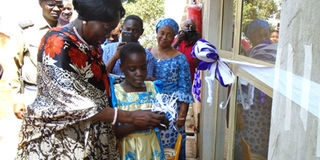Kadaga defends MPs Shs64b car deal

Speaker Rebecca Kadaga commissions a dormitory named after her at St Catherine Junior School in Mukono Municipality at the weekend. PHOTO BY FRED MUZAALE
What you need to know:
Justification. The Speaker of Parliament says she wonders whether critics want MPs to travel to Parliament on boda bodas.
Mukono. Speaker of Parliament Rebecca Kadaga has lashed out at critics of the Shs150m that each Member of Parliament will receive to buy a vehicle, saying the money is too little and will only enable them buy used vehicles.
Speaking as chief guest at a music concert for St Catherine Junior school, Namugongo, in Mukono Municipality at the weekend, Ms Kadaga said she was surprised that people were making “a lot of noise” about the money, which she said makes her wonder whether they want MPs to travel to Parliament on boda bodas.
“The Shs150m is going to buy a second hand vehicle. That money is a contribution to our facilitation and it is from our budget,” she said, amid murmurs of disapproval from some parents, who were heard saying: “still it is our money”.
By October, each of the 427 MPs will have received Shs150m to buy vehicles, a venture that will cost taxpayers about Shs64 billion. Many Ugandans are opposed to the move, with some saying MPs should use their allowances to buy themselves vehicles.
However, the Speaker defended the MPs’ vehicle grant, noting that a new MP she did not name recently used a boda boda to travel from Kampala to Entebbe to attend a meeting with the President at State House. She added that the legislator missed the meeting because he arrived late.
During the music and drama presentations, held under the theme, “Say No to Corruption,” the pupils condemned what they termed as “greed among MPs” that only care for their welfare and not that of their electorate.
Ms Kadaga also revealed that in an effort to better education standards in the country, Parliament had directed the Ministry of Education and Sports to close all schools that don’t meet minimum requirements such as infrastructure, adding that academic standards can only be raised through regular inspection and regulation.



